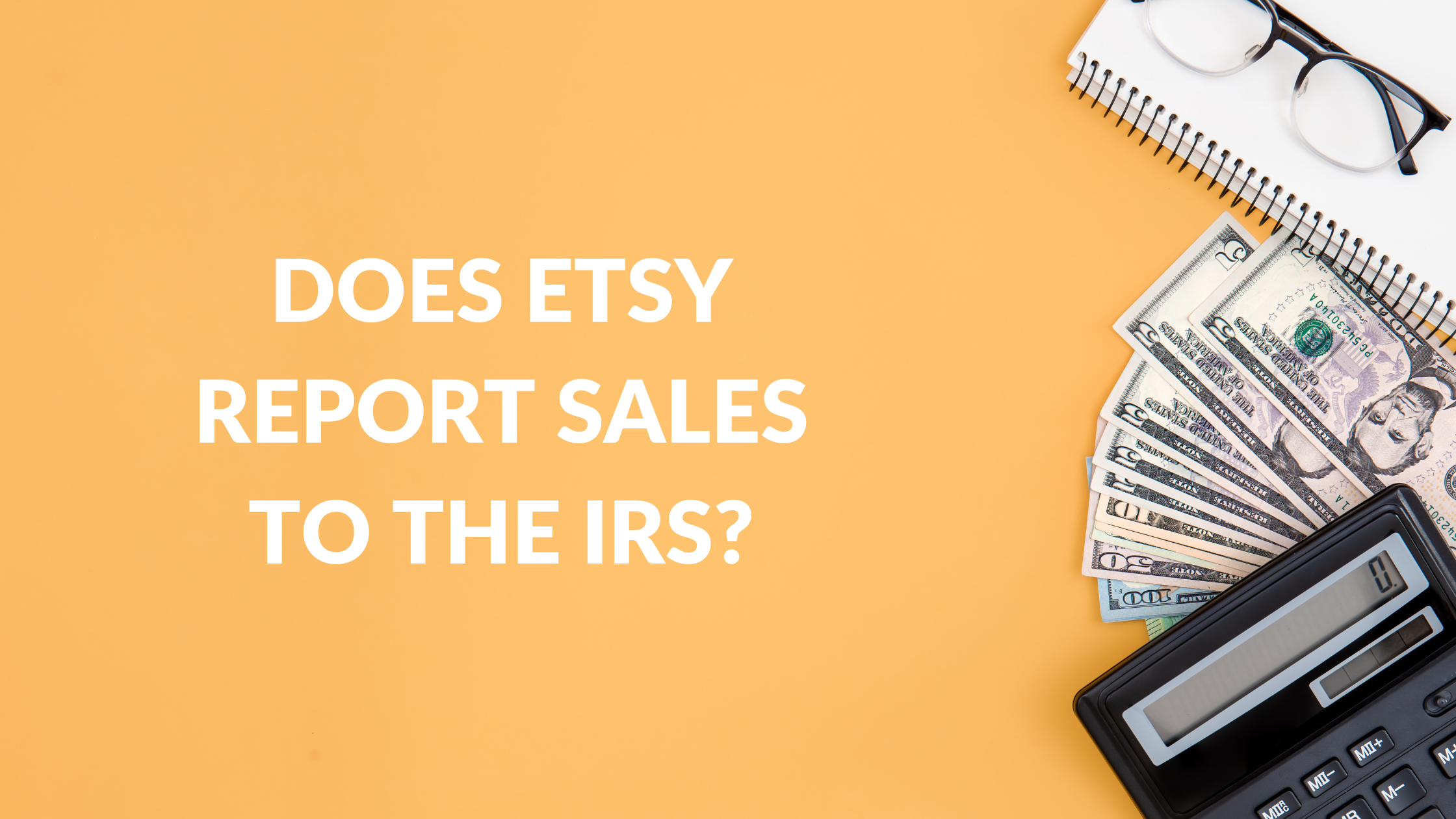Etsy is a popular online marketplace where individuals can sell their handmade goods, vintage items, and craft supplies. If you are an Etsy seller, you may be wondering if Etsy reports sales to the IRS. The short answer is yes, Etsy does report sales to the IRS.
Etsy tracks your sales using Etsy Payments, which is a payment processing system that allows buyers to purchase items using various payment methods, including credit cards, debit cards, and PayPal. At the end of the year, Etsy sends Form 1099-K to both you and the IRS, which reports your total sales using Etsy Payments, as well as other information. If you are a US seller and your gross sales exceed $20,000 USD and you have more than 200 transactions in a year, or you meet a threshold for your state, Etsy will provide you with a 1099-K form that you can use when filing your taxes.
What is Etsy?
Etsy is an online marketplace that allows individuals and small businesses to sell handmade, vintage, and unique goods. It was founded in 2005 and has grown to become a popular platform for artists, crafters, and vintage collectors to showcase and sell their products to a global audience.
Etsy has over 81 million active buyers and 4.4 million active sellers, making it one of the largest e-commerce platforms in the world. The platform offers a wide variety of products, including jewelry, clothing, home decor, art, and more.
Sellers on Etsy have the ability to customize their shops, set their own prices, and manage their inventory. They can also communicate with buyers directly through the platform and receive feedback on their products.
Etsy charges a small fee for each item sold and provides sellers with tools to manage their finances, including sales reports and tax information. However, it is important for sellers to understand their tax obligations and report their income to the IRS.
Tax Obligations for Etsy Sellers
As an Etsy seller, you are responsible for reporting your sales to the IRS and paying taxes on your income. This section will cover the two types of taxes that Etsy sellers need to consider: sales tax and income tax.
Sales Tax
If you sell physical goods on Etsy, you may be required to collect and remit sales tax to the state where your buyer is located. Each state has its own rules for sales tax, so it’s important to research the requirements for the states where you have customers. Etsy provides a tool called the Etsy Sales Tax Guide that can help you determine your sales tax obligations.
Income Tax
As an Etsy seller, you are also responsible for paying income tax on your profits. The IRS considers your Etsy sales to be self-employment income, which means you’ll need to report it on your tax return using Schedule C. You may also need to pay estimated taxes throughout the year if you expect to owe more than $1,000 in taxes.
To help you keep track of your income and expenses, Etsy provides a variety of tools, including the Etsy Payments dashboard and the Shop Manager’s Finances section. You can also use third-party accounting software to track your income and expenses.
In addition to federal income tax, you may also be subject to state and local income tax, depending on where you live and do business. Be sure to research the tax requirements for your state and local area to ensure that you are in compliance with all applicable tax laws.
Does Etsy Report Sales to the IRS?
If you’re an Etsy seller, you might be wondering whether Etsy reports your sales to the IRS. The short answer is yes, Etsy does report sales to the IRS, but there are certain requirements that must be met before they do so.
Etsy’s Reporting Policy
Etsy tracks your sales using Etsy Payments, which is their payment processing system. If you’re a US seller and you reach more than $20,000 in gross sales and more than 200 transactions in a calendar year, Etsy will provide you with a Form 1099-K that you can use when filing your taxes. The 1099-K form reports your total sales using Etsy Payments, plus other information.
It’s important to note that Etsy only reports your gross sales income from Etsy Payments on the 1099-K form. Your gross sales are the total amount your buyers have paid you for the entire year, without subtracting expenses such as fees, refunds, shipping costs, or sales tax collected by you.
IRS Requirements for Reporting
The IRS requires payment processors, including Etsy, to report certain transactions to them. The reporting threshold for payment processors is $20,000 in gross sales and 200 transactions in a calendar year. This means that if you meet or exceed these thresholds, Etsy is required to report your sales to the IRS.
Even if you don’t receive a 1099-K from Etsy, you’re still required to report your Etsy sales income on your tax return. If your state has income tax, you’ll need to pay state income taxes on the net income from your Etsy sales as well.
In short:
Etsy does report sales to the IRS if certain requirements are met. As an Etsy seller, it’s important to keep track of your sales and expenses and report them accurately on your tax return.
How to Report Etsy Sales on Your Taxes
If you are an Etsy seller, you are required to report your earnings to the IRS. Etsy may report your gross income to the IRS on Form 1099-K, but even if you don’t receive a 1099-K, you still have to report your Etsy sales income on your tax return.
Keeping Accurate Records
To report your Etsy sales accurately, you need to keep accurate records of your income and expenses. Keep track of all your sales, fees, and expenses related to your Etsy shop. Etsy provides a record of your sales in the Shop Manager section of your account. You can also download a CSV file of your sales data from the Download Data tab in your shop’s Options section.
Filing Your Taxes
When it comes time to file your taxes, you will need to report your Etsy income on your tax return. You will report your gross income on Schedule C (Form 1040), Profit or Loss from Business. You can deduct your expenses related to your Etsy shop, such as listing fees, transaction fees, and shipping costs, from your gross income to determine your net income.
If you made over $400 in net income from your Etsy shop, you will also need to pay self-employment tax. You will report your self-employment tax on Schedule SE (Form 1040), Self-Employment Tax.
In conclusion, reporting your Etsy sales on your taxes can seem overwhelming, but keeping accurate records and filing your taxes correctly can save you from any headaches down the road.
Consequences of Not Reporting Etsy Sales
If you are an Etsy seller, you must report your sales to the IRS, regardless of whether you receive a 1099-K form from Etsy or not. Failure to report your Etsy sales can lead to serious consequences, including penalties and fines, as well as legal issues.
Penalties and Fines
If you fail to report your Etsy sales or underreport your income, the IRS may impose penalties and fines. The penalties can be as high as 20% of the underreported amount. In addition, you may be required to pay interest on the underreported amount.
The IRS can also impose penalties for failing to file your tax return or filing it late. The penalty for failing to file your tax return can be as high as 5% of the unpaid taxes per month. The penalty for filing your tax return late can be as high as 5% of the unpaid taxes per month, up to a maximum of 25%.
Legal Issues
Failing to report your Etsy sales can also lead to legal issues. The IRS may conduct an audit of your tax return, which can be a time-consuming and expensive process. If the IRS determines that you intentionally failed to report your Etsy sales, you may be subject to criminal charges, including fines and imprisonment.
Failing to report your Etsy sales can also lead to legal issues with your state. If you are required to pay state income taxes on your Etsy sales and fail to do so, you may be subject to penalties and fines from your state’s tax authority.
Conclusion
It is essential to report your Etsy sales to the IRS and pay the required taxes. Failure to do so can lead to serious consequences, including penalties, fines, and legal issues.
I hope you found this guide covering whether Etsy reports sales to the IRS, useful! To learn more Etsy tips and tricks, check out the Thrive on Etsy Blog!

